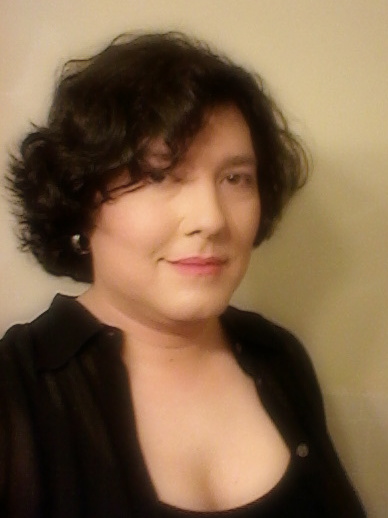You may have heard about “gender fog.” Also known as “pink fog,” “pink cloud” or “gender euphoria,” it’s an intense emotion that many transgender people experience around a significant event. I used to get it when I tried on a new outfit, particularly a kind that I had fantasized about (when I was a teenager, that involved short skirts and nylons). Now it mostly happens when I go out in public presenting as a woman.

This excitement is relative, and it depends on how much I’m used to the activity. If I haven’t cross-dressed at all in months, I may feel some gender fog just at cross-dressing. The same thing for shaving or haircuts, or new outfits. If I’ve been cross-dressing a lot, and shaving and maybe even getting new outfits on a regular basis, I don’t get as excited. Since I haven’t been going out cross-dressed very much lately, just going out can bring on very intense euphoria.
For me, gender fog generally starts as soon as I make plans to go out. I get insomnia, where instead of sleeping I lie in bed thinking about what I’m going to wear, where I’m going to change, whether I’m going to meet up with anyone, when I’m going to leave, where I’m going to shop and what I’m going to buy, whether I’ll have a meal, and so forth. I dwell on potential problems, mostly around passing: is my makeup technique good enough to cover my beard? Is my belly too big? Are my shoulders too broad? Will it be too hot to wear a dress that flatters my figure? Have I been practicing my voice enough? Will my sinuses be clear enough?
When I finish changing and actually go out in public, I usually get very excited. Then, since whatever activity I do in public lasts several hours (otherwise it’s not really worth putting on all the makeup), at some point in the day or evening I’ll feel kind of tired or bored, and think, “I could be doing this in guy clothes, and it’d be a lot easier.” But then there will usually be something else interesting or fun that happens. I’m typically tired at the end of the trip, and sometimes I sleep very well for several nights afterwards.
The post-event gender fog usually involves some experience that made me happy, usually because it confirms my role as a woman. Because of this, many of these involve passing or acceptance. I got a cute outfit. I used my female voice for the first time. A guard directed me to the women’s room in Rockefeller Center. A waiter flirted with me. A transitioned trans woman briefly thought I was a non-trans woman. A woman complimented my look. I went to an interesting part of the city or event that I’d never been to as a woman. Or maybe it was just the experience of walking through the city, being accepted as one of the women.
After the experience, I find myself dwelling on it, thinking about how I could repeat or extend it. If I got a cute outfit, I think about wearing it at home, or on a future outing. Maybe I think about future outfits. If it’s an interaction, I think about other interactions. If it’s a place, I think about going back to that place, or to other places. I also may think about things that were time-consuming or inconvenient, and about ways that I could make them easier.
If I had a really good time or if I did something really new for me, I may be high for days, thinking about nothing but my experience. My wife and friends get really tired of hearing about it. I have trouble concentrating at work. I may plan to go out again, sooner than I had originally thought. I may think about more “soft body mods,” like ear piercing, growing my hair or permanent leg or facial hair removal.
The gender fog always lasts for several days after the event. Usually I use ten days as a rule of thumb, although if I ever go out more than once in a ten-day period the excitement is compounded.
Yesterday I went out in public, and I’m definitely feeling the gender fog. It’s not as intense as it has been at some times. I had trouble sleeping the night before, and I was expecting to sleep better last night, but I had similar difficulties. On the other hand, my difficulty sleeping may be unrelated to this experience. I’ve been having insomnia lately anyway, and the heat doesn’t help.
Some of you may be scoffing at this. If you transitioned years ago and have been living a quiet life as your target gender, then yes you probably don’t have experiences like this. Similarly if you’ve got a stable genderqueer or genderfluid existence. If you’re transitioning then your outings are probably more extensive, frequent and social than my shopping trips. But I’ve seen transitioners have similar reactions to other milestones, particularly relating to hormonal body modifications and legal and social acceptance. I’m guessing that you’ve all had some feeling like this.

